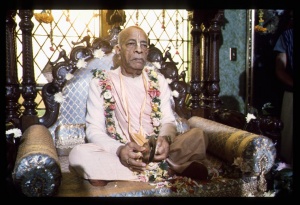SB 4.13.28: Difference between revisions
m (1 revision(s)) |
No edit summary |
||
| Line 1: | Line 1: | ||
{{info | {{info | ||
|speaker=priests engaged in the sacrifice of King | |speaker=priests engaged in the sacrifice of King Aṅga | ||
|listener=King | |listener=King Aṅga | ||
}} | }} | ||
[[Category:Srimad-Bhagavatam - Canto 04 Chapter 13]] | |||
[[Category:Bhagavatam Verses Spoken by the Priests Engaged in the Sacrifice of Anga Maharaja - Vanisource|041328]] | |||
<div style="float:left">'''[[Srimad-Bhagavatam]] - [[SB 4|Fourth Canto]] - [[SB 4.13: Description of the Descendants of Dhruva Maharaja|Chapter 13: Description of the Descendants of Dhruva Mahārāja]]'''</div> | |||
<div style="float:right">[[File:Go-previous.png|link=SB 4.13.27]] '''[[SB 4.13.27]] - [[SB 4.13.29]]''' [[File:Go-next.png|link=SB 4.13.29]]</div> | |||
{{RandomImage}} | |||
==== TEXT 28 ==== | ==== TEXT 28 ==== | ||
<div | <div class="verse"> | ||
na vidāmeha devānāṁ | :na vidāmeha devānāṁ | ||
helanaṁ vayam aṇv api | :helanaṁ vayam aṇv api | ||
yan na gṛhṇanti bhāgān svān | :yan na gṛhṇanti bhāgān svān | ||
ye devāḥ karma-sākṣiṇaḥ | :ye devāḥ karma-sākṣiṇaḥ | ||
</div> | </div> | ||
| Line 16: | Line 22: | ||
==== SYNONYMS ==== | ==== SYNONYMS ==== | ||
<div | <div class="synonyms"> | ||
''na''—not; ''vidāma''—can find; ''iha''—in this connection; ''devānām''—of the demigods; ''helanam''—insult, neglect; ''vayam''—we; ''aṇu''—minute; ''api''—even; ''yat''—because of which; ''na''—not; ''gṛhṇanti''—accept; ''bhāgān''—shares; ''svān''—own; ''ye''—who; ''devāḥ''—the demigods; ''karma-sākṣiṇaḥ''—witnesses for the sacrifice. | |||
</div> | </div> | ||
| Line 23: | Line 29: | ||
==== TRANSLATION ==== | ==== TRANSLATION ==== | ||
<div | <div class="translation"> | ||
Dear King, we do not find any reason that the demigods should feel insulted or neglected in any way, but still the demigods who are witnesses for the sacrifice do not accept their shares. We do not know why this is so. | Dear King, we do not find any reason that the demigods should feel insulted or neglected in any way, but still the demigods who are witnesses for the sacrifice do not accept their shares. We do not know why this is so. | ||
</div> | </div> | ||
| Line 30: | Line 36: | ||
==== PURPORT ==== | ==== PURPORT ==== | ||
<div | <div class="purport"> | ||
It is indicated herein that if there is negligence on the part of the priest, the demigods do not accept their share in sacrifices. Similarly, in devotional service there are offenses known as sevā-aparādha. Those who are engaged in worshiping the Deity, Rādhā and Kṛṣṇa, in the temple, should avoid such offenses in service. The offenses in service are described in The Nectar of Devotion. If we simply make a show of offering services to the Deity but do not care for the sevā-aparādha, certainly the Rādhā-Kṛṣṇa Deity will not accept offerings from such nondevotees. Devotees engaged in temple worship should not, therefore, manufacture their own methods, but should strictly follow the regulative principles of cleanliness, and then offerings will be accepted. | It is indicated herein that if there is negligence on the part of the priest, the demigods do not accept their share in sacrifices. Similarly, in devotional service there are offenses known as ''sevā-aparādha''. Those who are engaged in worshiping the Deity, Rādhā and Kṛṣṇa, in the temple, should avoid such offenses in service. The offenses in service are described in ''The Nectar of Devotion''. If we simply make a show of offering services to the Deity but do not care for the ''sevā-aparādha'', certainly the Rādhā-Kṛṣṇa Deity will not accept offerings from such nondevotees. Devotees engaged in temple worship should not, therefore, manufacture their own methods, but should strictly follow the regulative principles of cleanliness, and then offerings will be accepted. | ||
</div> | </div> | ||
__NOTOC__ | |||
<div style="float:right; clear:both;">[[File:Go-previous.png|link=SB 4.13.27]] '''[[SB 4.13.27]] - [[SB 4.13.29]]''' [[File:Go-next.png|link=SB 4.13.29]]</div> | |||
__NOTOC__ | |||
__NOEDITSECTION__ | |||
Revision as of 10:11, 16 May 2021

A.C. Bhaktivedanta Swami Prabhupada
TEXT 28
- na vidāmeha devānāṁ
- helanaṁ vayam aṇv api
- yan na gṛhṇanti bhāgān svān
- ye devāḥ karma-sākṣiṇaḥ
SYNONYMS
na—not; vidāma—can find; iha—in this connection; devānām—of the demigods; helanam—insult, neglect; vayam—we; aṇu—minute; api—even; yat—because of which; na—not; gṛhṇanti—accept; bhāgān—shares; svān—own; ye—who; devāḥ—the demigods; karma-sākṣiṇaḥ—witnesses for the sacrifice.
TRANSLATION
Dear King, we do not find any reason that the demigods should feel insulted or neglected in any way, but still the demigods who are witnesses for the sacrifice do not accept their shares. We do not know why this is so.
PURPORT
It is indicated herein that if there is negligence on the part of the priest, the demigods do not accept their share in sacrifices. Similarly, in devotional service there are offenses known as sevā-aparādha. Those who are engaged in worshiping the Deity, Rādhā and Kṛṣṇa, in the temple, should avoid such offenses in service. The offenses in service are described in The Nectar of Devotion. If we simply make a show of offering services to the Deity but do not care for the sevā-aparādha, certainly the Rādhā-Kṛṣṇa Deity will not accept offerings from such nondevotees. Devotees engaged in temple worship should not, therefore, manufacture their own methods, but should strictly follow the regulative principles of cleanliness, and then offerings will be accepted.